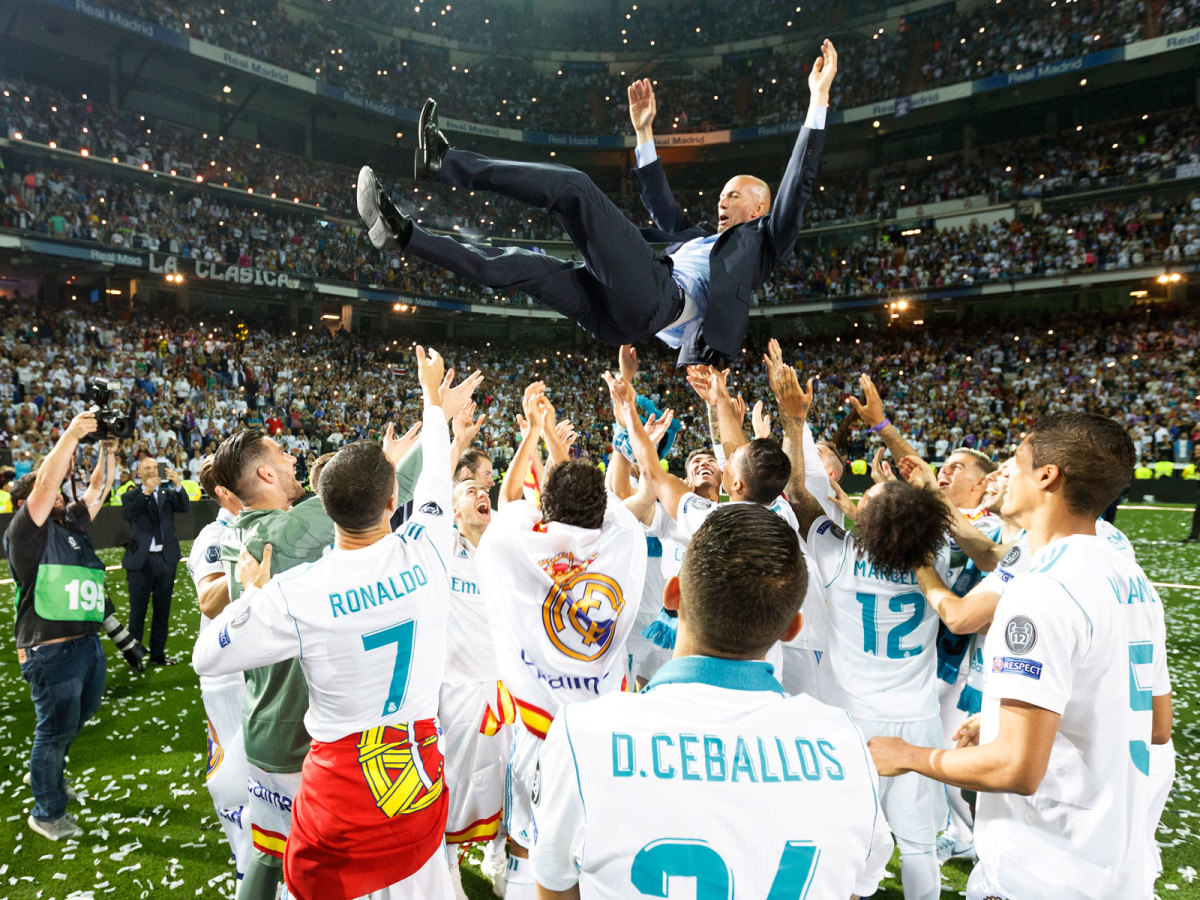Real Madrid Ushered Into Sudden Chaos After Zidane's Resignation

The atmosphere in Kiev’s Olimpiyskiy Stadium in the early hours of Sunday morning was fraught. There’s always a strange feeling after major finals, a sense of nervous exhaustion, euphoria and despair, press conferences and post-match interviews long-delayed by celebration and recrimination. The Champions League final had offered plenty to digest–a brilliant goal, two dreadful errors, an awful injury to a key player–but then there came the sense that something else was up.
Gareth Bale had talked about leaving, Cristiano Ronaldo had talked about leaving. Real Madrid may have become the first side in more than 40 years to be European champion three times in a row, but this was not a happy club. Every sentence, every word a Madrid player uttered seemed freighted with political significance. But on one thing everybody was agreed: manager Zinedine Zidane was safe–but that didn’t mean he might not walk away.
And on Thursday, he walked away.
Real Madrid's Champions League Triumph Defined By Bale's Heroics, Salah's Injury
In two and a half seasons of management, Zidane won three Champions League titles and a Spanish league crown. His teams didn’t control games, but they did win games. There often seemed to be little tactical sophistication, no philosophy to speak of, but again and again Madrid was good enough. If it could turn a game into a shootout, it had the firepower to triumph, again and again and again. It lived on the edge, it was lucky, but it won.
Precisely what role Zidane played in all of that was unclear. He soothed egos and persuaded Ronaldo to take a rest every now and again. He had a habit of making game-changing substitutions. He brought stability to the dressing room. But if that hinted at tactical acumen, it also raised the question of why game-changing substitutions were so often required; why did Madrid so often need salvaging? Even when his Madrid won the league in 2016-17, it was after a vaguely ridiculous runs of comebacks. And as recently as the Champions League quarterfinals, it nearly lost a 3-0 lead against Juventus while returning home for the second leg.
There was very rarely a sense of a team that shaped a game; his side, rather, was buffeted by the game but came through. There was great drama, and a club like Madrid perhaps thrives on that, but a part of coaching has always been to avoid drama, to win without fuss. There was almost a self-indulgence to Madrid’s success under him, a willingness to flirt with danger that perhaps is open only to the very wealthiest who would be bored were their resources to be deployed more ruthlessly, more efficiently.
"This is the right moment for everyone,” Zidane said at his press conference, hastily convened on Thursday. “It might seem a bit strange, but it had to be done for the good of everyone, the players, the club and myself. This team must keep winning, and it needs a change after three years, another voice, another method of working."
He had spoken earlier in the season of his tiredness, of how managing a club like Madrid, where success is never quite enough, saps at a coach. Perhaps he is simply weary. Perhaps he knows there will never be a peak like this. Perhaps the hunger has gone. It’s common to speak of payers, replete with success, struggling to find the drive to go again the following season, but the same is true of coaches also. Perhaps Zidane looked on an aging squad and recognized just how difficult the task of rebuilding it will be. Somebody at some point relatively soon, is going to have to deal with the end of Ronaldo.

And yet, explicable as Zidane’s departure is, nobody really saw it coming. Those Sunday morning predictions were the results of frazzled brains contemplating their own exhaustion and mortality and making a bold prediction based on little more than cod-psychology. Nobody knew, least of all Florentino Perez, whose baggy face was more hangdog than ever on Thursday.
If Madrid had known, it’s tempting to suggest Mauricio Pochettino, whom Perez openly admires, would not have signed a five-year contract with Tottenham last week. So who does come in? There are few obvious candidates. Antonio Conte is–almost certainly, although he technically remains Chelsea manager–available, but he does not necessarily seem like the right personality. Perez has twice courted Arsene Wenger before, but his time, surely, has gone. Carlo Ancelotti, those ever-reliable safe hands in a crisis, will take over at Napoli on July 1. Massimiliano Allegri has committed to Juventus.
So who? Laurent Blanc? Jogi Low? Leonardo Jardim? Marcelino? A complicated swap deal for Jose Mourinho with Gareth Bale heading to Old Trafford? There simply aren’t any obvious candidates.
A week after becoming the most successful European side in 60 years, Real Madrid is in chaos.
